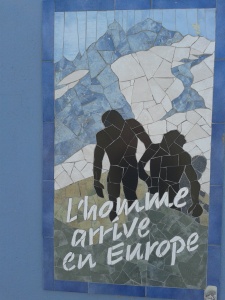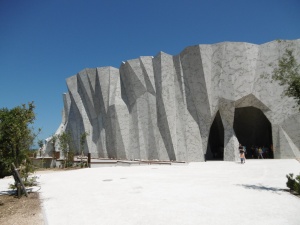Another account of life since graduating from Stirling. This time from Mira who, like Saara, also graduated in French in 2014 and who, since graduation, has gone on to develop a career as an interpreter but who was very pleased to get a chance to reflect on ‘the Stirling bubble’:
“This summer it will be two full years since my graduation, I can hardly believe it, and even less so the fact that it’s been nearly 6 years since I’ve started University, now that’s crazy!
 I came to Stirling, having chosen the university because of the attractive language courses it offered and the absolutely magical campus it occupied. Say what you want about big cities but no University in Scotland beats our campus. For me, Stirling was the perfect choice. Glasgow and Edinburgh are only a short train ride away, which is one of the best ways to relax and clear your head: listen to some music and watch the picturesque landscapes of Scotland pass you by.
I came to Stirling, having chosen the university because of the attractive language courses it offered and the absolutely magical campus it occupied. Say what you want about big cities but no University in Scotland beats our campus. For me, Stirling was the perfect choice. Glasgow and Edinburgh are only a short train ride away, which is one of the best ways to relax and clear your head: listen to some music and watch the picturesque landscapes of Scotland pass you by.
I loved studying at Stirling. All of our French lecturers were wonderful, so very different but all so passionate about what they teach. Their excitement seeped through into the students. I am very fond of languages. Speaking four fluently, I am fascinated by how they work, like huge intricate puzzles. All with such different parts that fit together in such different ways. So, naturally I thoroughly enjoyed the grammar and translation classes. Having lived in France for a short while when younger I was somewhat familiar with French culture. The course however broadened my understanding of francophone cultures, through courses that explored the different parts of the world and history when French was spoken.
I found everyone in the French department to be very approachable and ready to help. Our lecturers, with their oceans of knowledge, were always ready to share it with us and advise us on the ideas we were exploring. I find this important because to a certain extent, having a department that is not helpful and lecturers you don’t feel comfortable with hinders studies.
Stirling offers some pretty attractive exchange programs and when it came time to choose where to go for my semester abroad, I decided it had to be Paris. We were free to study pretty much anything we wanted while abroad and I loved my courses at Sciences Po. I took “Philosophy of Friendship”, “Utopia” and “The cultural history of Europe” all en français bien sûr! I still have all my notes and books from these and I have no doubt I will be re-reading them. The teaching differed quite a lot from Stirling, I think because the dynamic between the students and the lecturers just wasn’t the same.
 I must speak quickly about Paris. I didn’t know what to expect. My exchange took place from January until June, only six short months. Yet within these I built a whole new life. I made some amazing friends, whom I still see regularly now. My experience was bohemian and artistic, full of cheap wine and fresh baguettes, photographer friends who’d take beautiful pictures and bookshops with captivating events. Having studied much about France and French culture, it felt surreal to walk around Place de la République, or visit the Grand Palais and just stare in adoration at the beautiful architecture, and think how many people passed through these places through the century. Spending half a year somewhere lets you discover the “hidden” gems of the city, when first visiting Paris you will go to the Jardin du Luxembourg or the Tuileries but it’s places like Parc des Buttes Chaumont, that truly stole my heart.
I must speak quickly about Paris. I didn’t know what to expect. My exchange took place from January until June, only six short months. Yet within these I built a whole new life. I made some amazing friends, whom I still see regularly now. My experience was bohemian and artistic, full of cheap wine and fresh baguettes, photographer friends who’d take beautiful pictures and bookshops with captivating events. Having studied much about France and French culture, it felt surreal to walk around Place de la République, or visit the Grand Palais and just stare in adoration at the beautiful architecture, and think how many people passed through these places through the century. Spending half a year somewhere lets you discover the “hidden” gems of the city, when first visiting Paris you will go to the Jardin du Luxembourg or the Tuileries but it’s places like Parc des Buttes Chaumont, that truly stole my heart.
I really enjoyed the final year of university, maybe because of the independence in study and writing that we had. Writing the dissertation meant you chose an area of interest personal to you and just plunged into it. Sure it was stressful, you had to be driven, organised and generally on top of things, but doing the research, analysing the information and creating a report was very satisfying and rewarding.
My friends and I always talk about the “Stirling Bubble”, nothing is far away and after a year you pretty much know everyone and everything. Which makes you feel at home, safe and cosy, and that’s something big cities can’t offer. On top of it all Stirling has some really interesting young talents, community initiatives and creative events. The Filth and Aztec music gigs remain some of the best ones I’ve been to.
My time at the University of Stirling has provided me with skills and experiences that have led me to where I am today. I live in Scotland and work as a Polish interpreter. I currently work with: local schools, social work offices, health centres, the police and even the courts. In fourth year we went to a multilingual debate at Heriot-Watt University. The debaters all spoke different languages and their conversation was possible due to the final year students of an interpreting course. It was my first time witnessing the mechanics of interpreting in action and I was fascinated. Throughout our language classes I had amassed the skills to work with language. We worked thoroughly on each text we translated for practice, exchanging ideas and methods. We would discuss the intricacies of the language and the many connections that words create between each other. What meaning these connections of words convey and how to transfer that meaning into a different language. Realising that sometimes it is absolutely crucial to know where the words come from and how they are used in contemporary society in order to fully grasp the subtle differences in meaning between individual words. Learning that often you can only become truly fluent in a language if you understand the culture of the people that speak it. That is exactly what the French degree at the University of Stirling equipped me with.”
Many thanks to Mira for sending this blog post and all the best for the years ahead!






 I came to Stirling, having chosen the university because of the attractive language courses it offered and the absolutely magical campus it occupied. Say what you want about big cities but no University in Scotland beats our campus. For me, Stirling was the perfect choice. Glasgow and Edinburgh are only a short train ride away, which is one of the best ways to relax and clear your head: listen to some music and watch the picturesque landscapes of Scotland pass you by.
I came to Stirling, having chosen the university because of the attractive language courses it offered and the absolutely magical campus it occupied. Say what you want about big cities but no University in Scotland beats our campus. For me, Stirling was the perfect choice. Glasgow and Edinburgh are only a short train ride away, which is one of the best ways to relax and clear your head: listen to some music and watch the picturesque landscapes of Scotland pass you by. I must speak quickly about Paris. I didn’t know what to expect. My exchange took place from January until June, only six short months. Yet within these I built a whole new life. I made some amazing friends, whom I still see regularly now. My experience was bohemian and artistic, full of cheap wine and fresh baguettes, photographer friends who’d take beautiful pictures and bookshops with captivating events. Having studied much about France and French culture, it felt surreal to walk around Place de la République, or visit the Grand Palais and just stare in adoration at the beautiful architecture, and think how many people passed through these places through the century. Spending half a year somewhere lets you discover the “hidden” gems of the city, when first visiting Paris you will go to the Jardin du Luxembourg or the Tuileries but it’s places like Parc des Buttes Chaumont, that truly stole my heart.
I must speak quickly about Paris. I didn’t know what to expect. My exchange took place from January until June, only six short months. Yet within these I built a whole new life. I made some amazing friends, whom I still see regularly now. My experience was bohemian and artistic, full of cheap wine and fresh baguettes, photographer friends who’d take beautiful pictures and bookshops with captivating events. Having studied much about France and French culture, it felt surreal to walk around Place de la République, or visit the Grand Palais and just stare in adoration at the beautiful architecture, and think how many people passed through these places through the century. Spending half a year somewhere lets you discover the “hidden” gems of the city, when first visiting Paris you will go to the Jardin du Luxembourg or the Tuileries but it’s places like Parc des Buttes Chaumont, that truly stole my heart.







You must be logged in to post a comment.